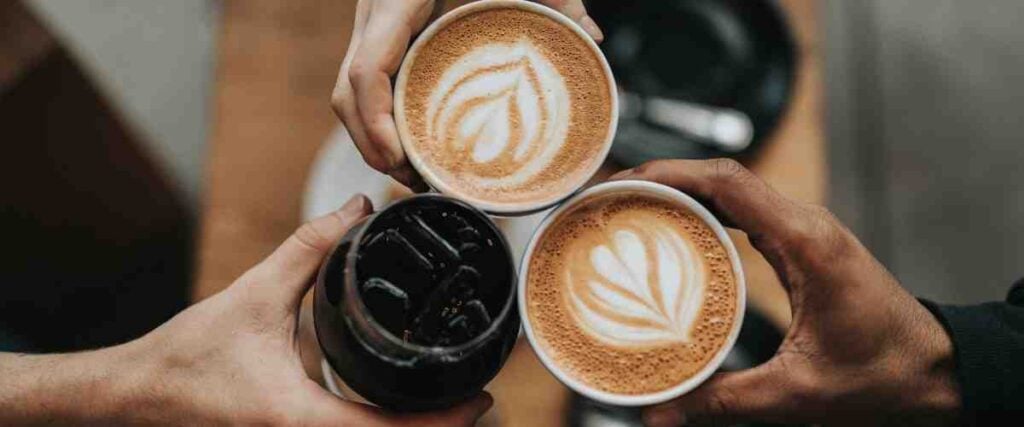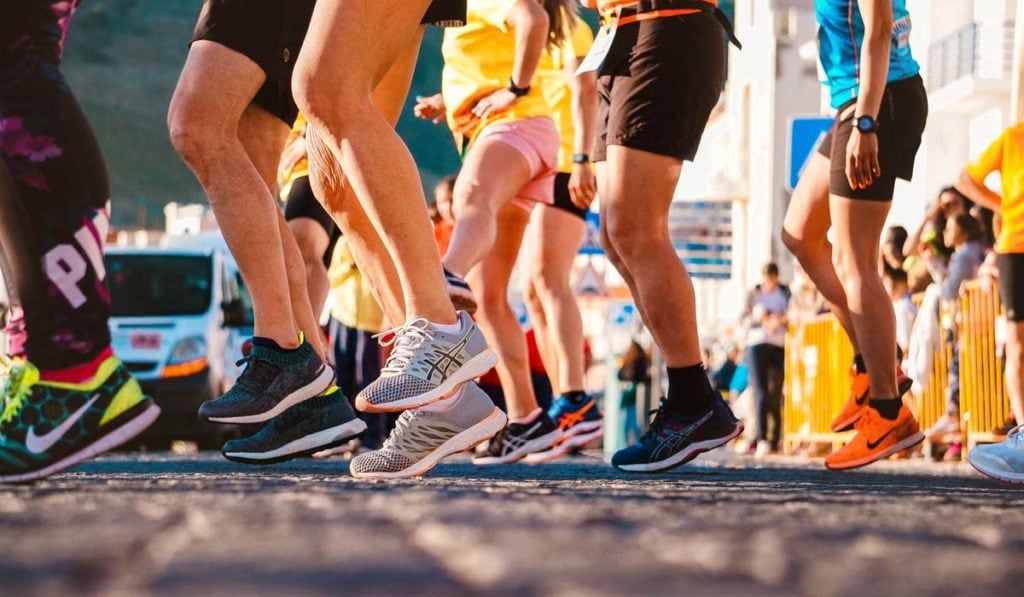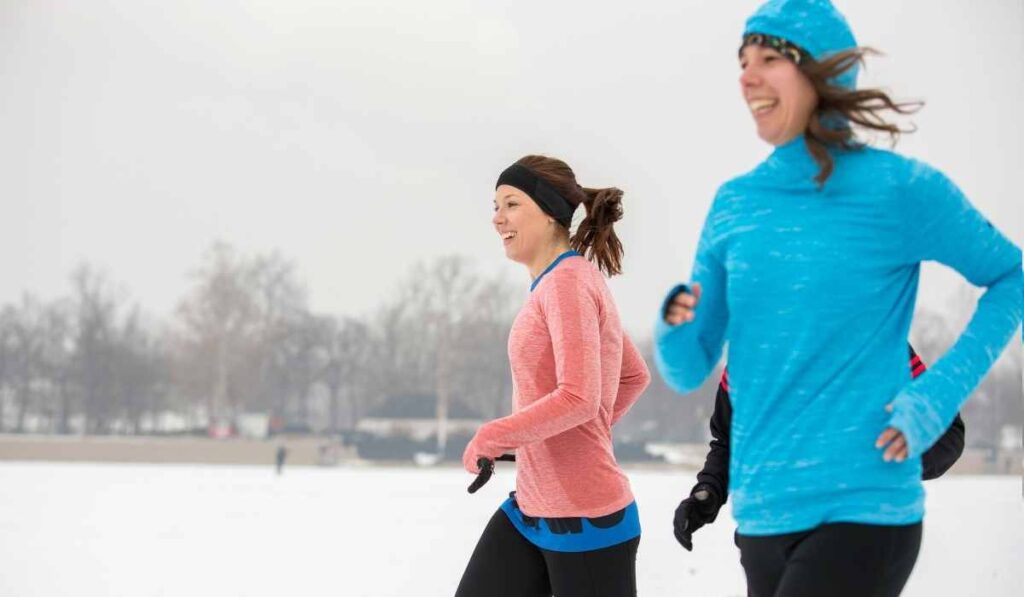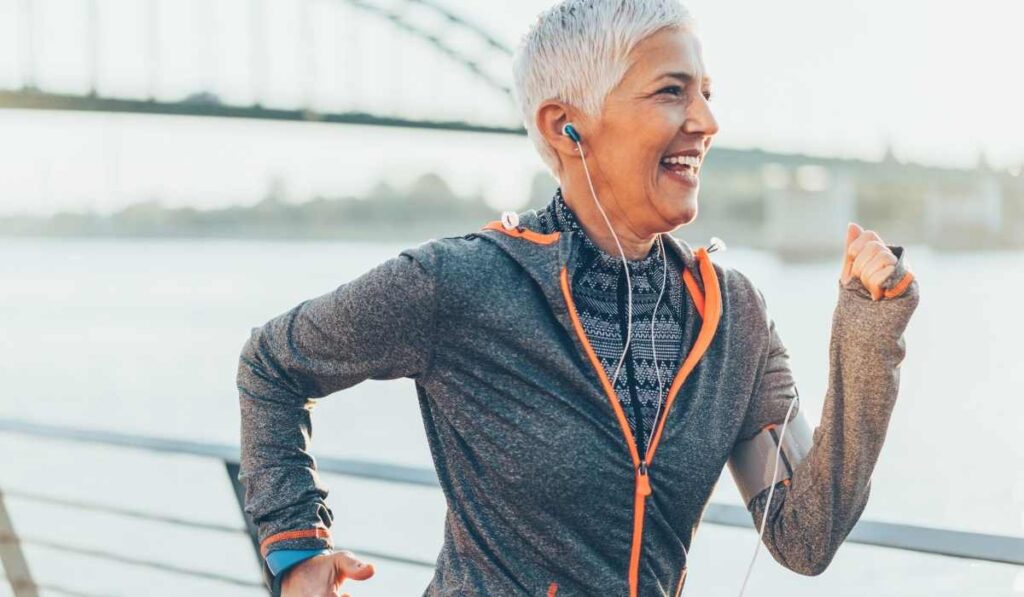
Caffeine & Running: Everything You Need to Know
Most of us start each day with a steaming hot cup of coffee. Aside from helping us break through the fog of sleepiness and become more alert and awake, many runners also use caffeine to boost their performance. But if you plan to use caffeine as a performance enhancer, how much coffee should you drink, when should you drink it, and what potential side effects (good and bad) might you experience? We’ll explore this topic to provide you with some answers.
What is caffeine, and how does it work?

Caffeine is a substance that occurs naturally in certain plants, including coffee and tea leaves. Scientists also make synthetic caffeine in labs, which is added to drinks, food, gum, snacks, and medicine. Most people consume caffeine in beverages like tea, coffee, energy drinks, or soda.
When you drink or eat caffeine, it stimulates your central nervous system, which makes you feel more alert and awake. Some people are more sensitive to the effects of caffeine than others. Typically, you’ll feel the most alert about an hour after consuming caffeine, and some people continue to feel its effects for up to six hours after consuming it.
Most people can have up to 400 milligrams of caffeine daily without any harmful side effects.1 However, certain people should limit or avoid caffeine, such as those who:
- Are pregnant
- Are breastfeeding
- Are children or teens
- Have anxiety or sleep disorders
- Have chronic headaches
- Have high blood pressure or problems with their heart rate, such as arrhythmia
- Take certain medications or supplements (there might be harmful interactions between the medicine and caffeine)
How coffee affects running performance

Believe it or not, caffeine and running go hand-in-hand. Many research studies have documented the effects of caffeine on athletic performance, and there’s a lot of proof that it enhances running performance and other athletic activities, like cycling.2 (There’s a reason cyclists also tend to love coffee!)
Here are some of the main ways caffeine can affect running performance:
- Running feels easier: Caffeine can boost your mood and increase your desire to run by increasing the production of endorphins and other feel-good chemicals in your body. This may also help reduce your pain perception and overall exertion while exercising.
- It may increase your pace: Caffeine enhances your reaction time and the speed and efficiency of communication between your brain and muscles. As a result, your leg muscles fire faster and more forcefully, making you a faster and more efficient runner.
- It may help you burn more fat: Caffeine may also enhance your body’s use of fat as a fuel source, conserving your glycogen stores and helping you burn off fat! Researchers aren’t exactly sure how this works, but there is convincing evidence that it does.3 Of course, if you load up your coffee with cream and sugar, the weight-loss benefits are likely to be nullified. Sticking with a simple cup of black coffee might provide the most fat-burning benefits if that’s what you’re after.
- It increases your mental alertness: When you consume caffeine, it blocks a molecule called adenosine, which regulates your sleep-wake cycle by telling your brain to slow down and get ready for sleep. When caffeine blocks some of those receptors, you feel more alert and energized.
For these reasons, caffeine is a very popular pre-workout supplement for many runners. Many runners avoid drinking a lot of coffee or consuming other forms of caffeine, but when they do, it’s very strategic and strictly for performance-enhancing purposes. Regardless, you should also know that these positive effects of caffeine can also vary depending on your genetic makeup.
Sports nutrition is highly individualized and the same should be true for how you approach caffeine and running. The rate at which you metabolize caffeine (as well as how it affects you) will vary depending on your genetic makeup and other factors. Current research studies suggest that certain athletes may benefit from caffeine consumption more than others, depending on their genetic makeup. Still, we need more research before we can draw firm conclusions on that.4
Side effects of coffee before running

Like all supplements and performance-enhancing substances, there are some drawbacks to using caffeine to enhance your running performance. For example, if you have too much caffeine, it may cause some adverse side effects, including:
- Gastrointestinal issues
- Frequent urination
- Jitters
- Restlessness and shakiness
- Insomnia
- Headaches
- Dizziness
- Fast heart rate
- Dehydration
- Anxiety
- Dependency (you need more caffeine to get the same results)
How much caffeine should you drink before running?

Most experts recommend having about 5 to 6 milligrams of coffee for every kilogram of body weight. But the best way to determine how much caffeine to drink before a run is to start small and listen to your body.
Coffee doesn’t affect everyone in the same way. So, some people may be able to drink a cup of coffee right before going on a run and have no issues at all. In contrast, others could experience gastrointestinal upset, shakiness, and other undesirable side effects.
Although caffeine and running tend to complement one another, that’s not always true for everyone. Keep that in mind and use caffeine cautiously.
How much caffeine is too much for athletes?

According to Global Sport Matters, athletes should consume about 350 milligrams or less of caffeine daily. Once you reach around 500 milligrams a day, the caffeine can become addictive, and you may start experiencing adverse side effects.5
If you think you might be consuming too much caffeine, gradually reduce your intake until you reach a healthier level. It’s important not to quit caffeine cold turkey if you’re accustomed to having it daily. Otherwise, you could experience symptoms of caffeine withdrawal, such as:1
- Headaches
- Drowsiness
- Irritability
- Nausea
- Trouble concentrating
When should I drink caffeine for enhanced running performance?

In most cases, it doesn’t matter when you have caffeine before a run, but the effects of the caffeine will peak in your body about 30 to 60 minutes after having a cup of coffee. Otherwise, the positive performance-enhancing effects of caffeine last for several hours, so you don’t have to chug a cup of coffee right before you head out for a run. Instead, you can enjoy its lasting benefits for a decent amount of time.
Some people prefer to run right after their morning cup of joe, while other runners prefer to consume a caffeinated energy gel or chew mid-run for a quick performance boost and pick-me-up. What works best for you won’t necessarily be best for others.
The most important thing is finding the best dose and timing for your body. As we said, start with a small amount of caffeine and gradually increase it, depending on how your body responds. Just try not to experiment with caffeine for the first time during a race! Otherwise, you could suffer some unfortunate consequences.
Key Takeaways:
Caffeine is a well-known performance-enhancing substance for runners, and it can be highly effective when used safely and strategically. If you drink coffee or consume caffeinated energy gels or chews to enhance your running performance, make sure you’re using a safe amount for your body.Sources:
- Caffeine. (n.d.). Retrieved October 21, 2022, from https://medlineplus.gov/caffeine.html
- Burke, L. M. (2008, December). Caffeine and sports performance. Applied Physiology, Nutrition, and Metabolism, 33(6), 1319–1334. https://doi.org/10.1139/h08-130
- Tabrizi, R., Saneei, P., Lankarani, K. B., Akbari, M., Kolahdooz, F., Esmaillzadeh, A., Nadi-Ravandi, S., Mazoochi, M., & Asemi, Z. (2018, October 18). The effects of caffeine intake on weight loss: a systematic review and dos-response meta-analysis of randomized controlled trials. Critical Reviews in Food Science and Nutrition, 59(16), 2688–2696. https://doi.org/10.1080/10408398.2018.1507996
- Guest, N. S., VanDusseldorp, T. A., Nelson, M. T., Grgic, J., Schoenfeld, B. J., Jenkins, N. D. M., Arent, S. M., Antonio, J., Stout, J. R., Trexler, E. T., Smith-Ryan, A. E., Goldstein, E. R., Kalman, D. S., & Campbell, B. I. (2021, January 2). International society of sports nutrition position stand: caffeine and exercise performance. Journal of the International Society of Sports Nutrition, 18(1). https://doi.org/10.1186/s12970-020-00383-4
- Noriega, E. (2018, September 11). Caffeine: The athlete’s (mostly) legal performance booster. Global Sport Matters. Retrieved October 21, 2022, from https://globalsportmatters.com/health/2018/08/29/caffeine-the-athletes-mostly-legal-performance-booster/








